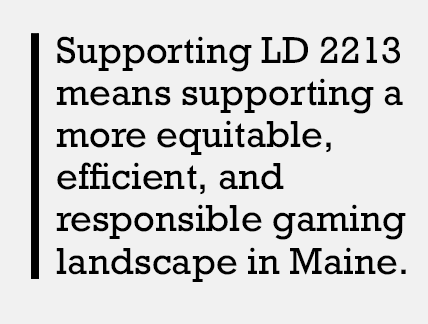
LD 2213 Allows Veterans’ Groups to Raise More Money
LD 2213, also known as “An Act to Support Nonprofit Organizations and Federally Recognized Indian Tribes by Authorizing the Operation of Electronic Lucky Seven or Similar Sealed Ticket Devices and Updating the High Stakes Beano Law,” is paving the way for a brighter future for veterans’ groups, nonprofits, tribes, and the entire community. Let’s dive into what this groundbreaking legislation accomplishes:
Modernization Made Simple LD 2213 represents a straightforward approach to modernizing existing charitable games. By introducing electronic lucky seven devices, the bill brings the gaming experience into the 21st century.
LD 2213 represents a straightforward approach to modernizing existing charitable games. By introducing electronic lucky seven devices, the bill brings the gaming experience into the 21st century.
Support for Veterans’ Groups, Nonprofits, and Tribes
One of the most significant aspects of LD 2213 is its support for veterans’ organizations, fraternal groups, and other nonprofit civic entities. By modernizing paper games, this bill provides struggling nonprofits with fresh opportunities to increase membership and enhance member facilities.
Efficient Oversight and Enforcement
LD 2213 introduces a state-of-the-art electronic tracking system for gaming activities, improving the administrative oversight of the Maine Gambling Control Unit (GCU). With live reporting and automated reports, enforcement becomes more efficient, reducing the burden on staff and ensuring accurate compliance.
Responsible Limits and Controls
To maintain integrity in gaming operations, LD 2213 establishes reasonable limits on the number of gaming devices for nonprofits and tribes. Additionally, it sets strict controls on hours of operation, promoting responsible gaming practices and ensuring a safe gaming environment.
Streamlined Reporting and Enforcement
By embracing electronic platforms, LD 2213 streamlines reporting processes and enhances enforcement capabilities. With access to real-time data, the GCU can effectively monitor gaming activities and address any issues promptly.
Addressing Concerns and Improving Integrity
LD 2213 tackles head-on concerns related to manipulation and shrinkage in paper games head-on. By transitioning to electronic platforms, the bill increases compliance and strengthens the integrity of charitable gaming practices.
Supporting LD 2213 means supporting a more equitable, efficient, and responsible gaming landscape in Maine. Together, we can empower nonprofits, tribes, and the entire community to thrive. Join us in advocating for this transformative legislation and shaping the future of charitable gaming.
